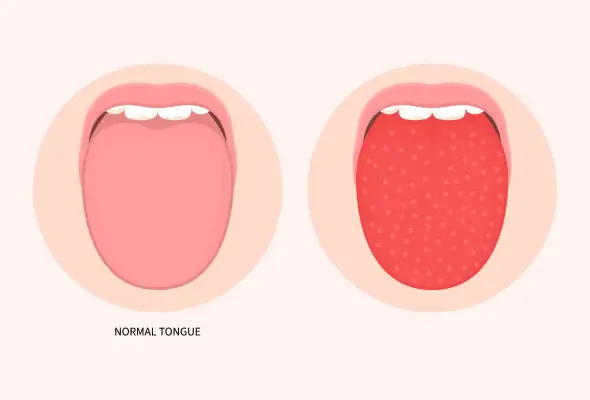-
Doctors
-
Specialities & Treatments
Centre of Excellence
Specialties
Treatments and Procedures
Hospitals & Directions HyderabadCARE Hospitals, Banjara Hills CARE Outpatient Centre, Banjara Hills CARE Hospitals, HITEC City CARE Hospitals, Nampally Gurunanak CARE Hospitals, Musheerabad CARE Hospitals Outpatient Centre, HITEC City CARE Hospitals, Malakpet
HyderabadCARE Hospitals, Banjara Hills CARE Outpatient Centre, Banjara Hills CARE Hospitals, HITEC City CARE Hospitals, Nampally Gurunanak CARE Hospitals, Musheerabad CARE Hospitals Outpatient Centre, HITEC City CARE Hospitals, Malakpet Raipur
Raipur
 Bhubaneswar
Bhubaneswar Visakhapatnam
Visakhapatnam
 Nagpur
Nagpur
 Indore
Indore
 Chh. Sambhajinagar
Chh. SambhajinagarClinics & Medical Centers
Book an AppointmentContact Us
Online Lab Reports
Book an Appointment
Consult Super-Specialist Doctors at CARE Hospitals

Swollen Tongue
Symptom, Causes, Diagnosis and Treatment
Swollen Tongue
A swollen tongue can be quite discomforting and can also impact breathing or swallowing. The swelling can appear in the outer or inner parts of the tongue or in both areas simultaneously. Understanding the causes, symptoms, diagnosis, and treatment of a swollen tongue is important in managing the situation. We will provide more detailed information about swollen tongue and more insight into its management.

Causes of a Swollen Tongue
Swelling in the tongue could be due to many reasons. Here are a few causes of tongue swelling:
- Allergic Reactions: Food, medicine, and other allergies can immediately cause swelling inside the tongue. Some common allergens are nuts, shellfish, eggs, and certain medications.
- Infections: Swelling of the tongue could be caused by infections, which are in the form of bacteria, viruses, or fungi. Oral thrush is a type of fungal infection which causes swelling.
- Sjogren's Syndrome: Sjogren's disease destroys the salivary glands, causing dry mouth and irritation of the tongue.
- Injury or Trauma: Biting your tongue, burning it with very hot food or drink, etc., can lead to local swelling.
- Deficiencies in Nutrition: Deficiency in vital nutrients such as vitamin B12, folic acid, and iron may cause inflammation and swelling of the tongue.
- Medical Conditions: Hypothyroidism, sarcoidosis, and cancer are medical conditions that cause a swollen tongue.
- Medications: Some medications, particularly used to treat high blood pressure, are known to cause swelling inside the tongue.
Symptoms of Tongue Inflammation
The symptoms that come with tongue swelling may differ based on the cause. These are the common swelling of tongue symptoms:
- The most typical sign of a swollen tongue is pain, particularly if the swelling is brought on by an allergic response or an injury.
- Difficulty Breathing or Swallowing
- A burning feeling with redness that may cover the entire tongue or only some of it.
- Change in taste perception.
- Dry Mouth
- Smooth appearance on the surface of the tongue.
Diagnosis
Diagnosis of the swollen tongue involves the following:
- Reviewing Medical History: Details about your medical history will be asked, including details on allergies that one has, any recent injury, or underlying medical conditions.
- Physical Examination: There will be an examination of the tongue and oral cavity to determine the extent and localization of the swelling.
- Allergy Tests: In case of suspicion of an allergic reaction, allergy tests can be done to identify the allergen.
- Blood Tests: Blood tests may provide evidence of underlying infections, nutritional deficiencies, or medical conditions that cause swelling.
- Imaging: Imaging tests, including X-rays or even MRI scans, may sometimes be required to rule out tumours and structural problems.
How to Treat a Swollen Tongue?
Swelling of tongue treatment depends on its causes:
- Allergic Reactions: The immediate application of antihistamines or corticosteroids can help reduce swelling caused by allergies. In severe reactions, epinephrine may be required.
- Infections: Depending on the type, appropriate antibiotics, antifungals, or antivirals are prescribed to care for the infection.
- Trauma: Rest, cold compresses applied to the tongue, and keeping away from the irritants permit healing.
- Nutritional Deficiencies: Supplements or dietary modifications can minimise swelling, cure deficiencies, and reduce inflammation.
- Underlying Medical Conditions: Treating the underlying condition—for instance, thyroid disease or cancer—will often alleviate tongue swelling.
Home Remedies for a Swollen Tongue
While medical treatment may be required in many instances, several home remedies could immensely help alleviate the uneasiness caused by a swollen tongue. The remedies for a swollen tongue are as follows:
- Cold compress: A cold compress or sucking on ice chips may help reduce the swelling and bring down throbbing.
- Warm salt water gargle: Studies have shown that gargling in warm salt water reduces swelling and has infection-treating properties.
- Honey: Honey is antibacterial in nature and thus may be applied locally on a swollen tongue or mixed in warm water.
- Turmeric: Mix turmeric powder with water and apply it over the swelling. Turmeric has anti-inflammatory properties that will help reduce the swelling.
- Coconut Oil: Coconut oil's antifungal, antibacterial, and antiviral qualities may help soothe a painful tongue. Using a cotton ball, apply the oil directly to the hurting spot and gently rub it in. Alternatively, you might swirl it around in your mouth and expel it.
Using mouthwash, flossing, and a soft toothbrush to clean your teeth can relieve a sore tongue and avoid infection. Additionally, you might find that toothpaste without sodium lauryl sulphate relieves pain. Maintain oral hygiene is paramount to prevent swollen tongue.
When Should I See a Doctor?
Even if home remedies prove very effective, one should consult a doctor under the following symptoms:
- Severe Swelling: When severe swelling affects breathing or swallowing, one must seek help from a doctor.
- Persistent Swelling: If the swelling does not improve much with home remedies, or if it goes on unabated for more than a few days, one should see a doctor.
- Fever and Chills: These could be symptoms of an infection that requires medical attention.
- Unexplained swelling: If you cannot identify a clear cause for the swelling, then it is important to get medical advice to rule out serious conditions.
Conclusion
A swollen tongue can be very discomforting and may be caused by various factors. Diagnosing what has caused the swelling of the tongue is very important for a proper cure for swollen tongue. While a wide range of home remedies for swollen tongue problems exist, which do work, always seek medical advice if the symptoms are severe or persistent. Knowing the symptoms, causes, and treatment for a swollen tongue will help you cope with this condition effectively and ensure timely medical intervention in the process. Staying informed and proactive, discomfort can be minimised, and oral health can be maintained.
FAQs
Q1. How do you get rid of a swollen tongue at home?
Ans. A swollen tongue can be managed with cold application, gargling with warm salt water, honey, or aloe vera, which are anti-irritants, and applying turmeric paste, which is anti-inflammatory. Also, avoid potential irritants and rest your tongue to help it heal.
Q2. What does a large tongue indicate?
Ans. A big tongue, or macroglossia, might indicate some problems—genetic conditions (e.g., Down syndrome), hypothyroidism, infections, or allergies. It also can result from trauma and nutritional deficiencies. A healthcare professional should evaluate persistent enlargement to determine the underlying pathology and appropriate treatment.
Q3. Should I worry about a swollen tongue?
Ans. Swollen tongues are a concern since they can be due to allergies, infections, or other medical conditions. If serious, constant swelling is experienced, it's important to seek immediate medical attention, especially if accompanied by shortness of breath or difficulty swallowing. Early diagnosis and treatment are essential to control the underlying cause and to prevent complications.
To Book an Appointment, call:
Still Have a Question?




